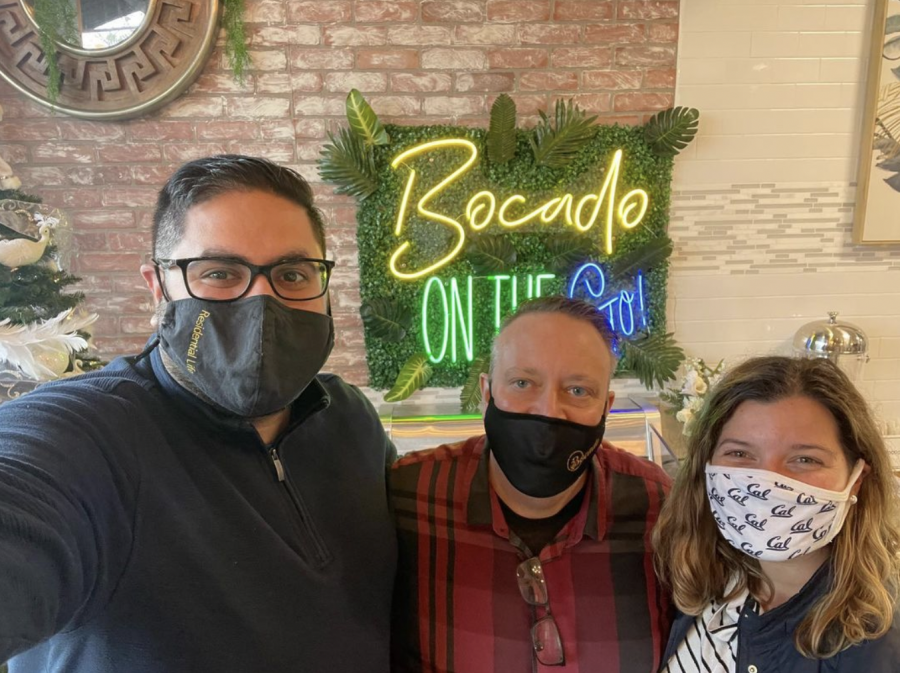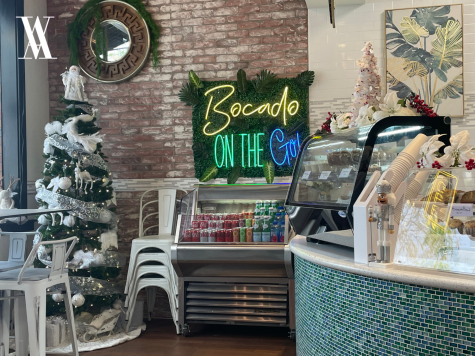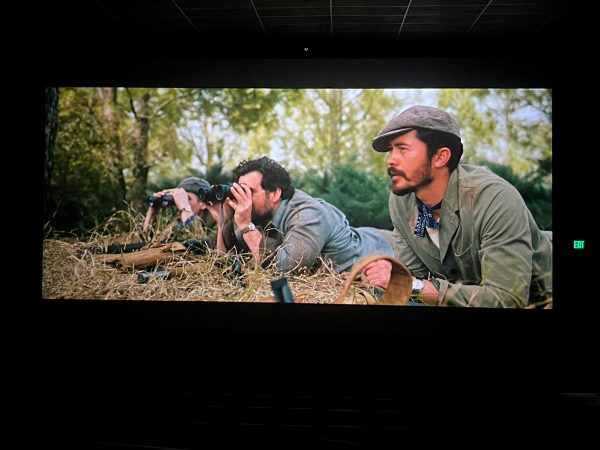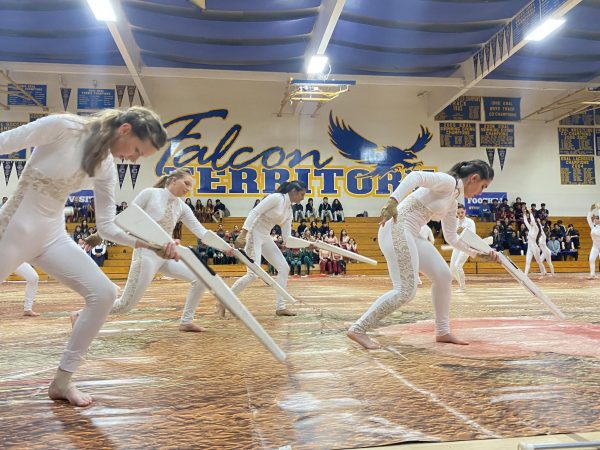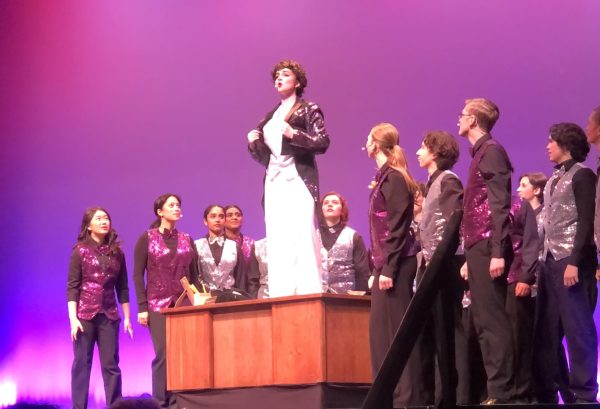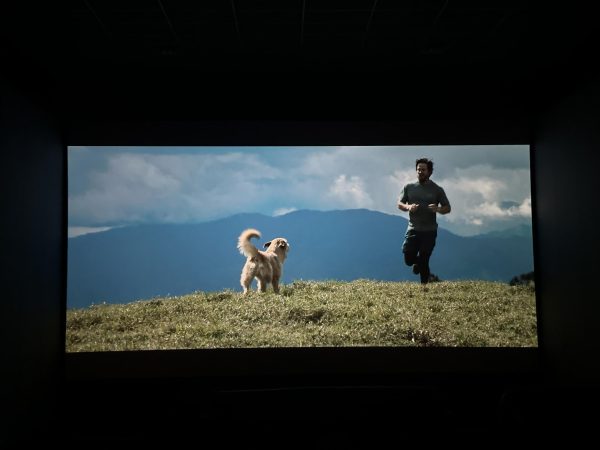Chef Castillo whisks creativity and community in new downtown bistro Bocado
Castillo and Carroll take a photo with customer and supporter Marney.
Dressed in a bright pop-art mashup shirt and black cap, navy apron in front, Chef Diego Castillo beams as another happy family thanks him for his service. He grabs a couple of coupon vouchers for them, sees them out the door. Then, he turns to me, and the smile on his face widens.
“Welcome to Bocado!”
A culinary dream
For as long as he can remember, Castillo dreamed of becoming a chef and running his own restaurant. Aside from physically satisfying customers’ stomachs, he savors the pure joy from cooking for a community. For him, food plays an essential role in any town or city.
“That’s your fuel right there to keep going throughout the day. If you’re able to find great food, you’re able to work better, you’re able to perform better in your day-to-day life,” said Castillo.
His childhood in Mexico honed his taste buds and appreciation of good, simple food. As a kid, he would frequently roam around his neighborhood, sniffing the air and sampling the street food.
“There was this place that made huaraches. They had cheese and meat and avocado and selancho,” said Castillo. “I just loved them [because] they were so good. That’s one of the best memories I remember.”
These experiences invigorated him. During those tender, childhood years, Castillo realized the kitchen was where he belonged–and where he was happiest. He resolved to become a chef, but pursuing his dream career would not be easy.
“It was difficult growing up in a Mexican family, [because] at the time, it was not a good look for a man to be a cook, [but] I fought my way through it and it got me here,” said Castillo.
Castillo’s journey is a rarity in that he never attended culinary school, but he prefers not to be called “self-taught,” citing the abundant talented chefs he’s worked with and learned from in the art of cooking.
“Jeffery Gombola in New York–he was an amazing chef [and] I learned a lot from him– Taylor Smith, executive chef for Drakes [Hotel], [and] I had a chance to work with Sally Dyu, and a bunch of other people who were great inspirations for me,” said Castillo.
A “modern American” palette
His eclectic experiences in the industry, from working in San Francisco restaurants to running 42 food trucks exclusively for Google, allowed him to interact with cuisines from different cultures.
There, Castillo began to experiment by blending, matching, and mismatching different flavors together to create new meals. Just like how he elevated himself in the food world on a diverged path, he takes an unconventional approach to cooking itself.
To him, recipe books are all very well, but dishes can only truly touch the heart when they cast away the rigidity of cookery guidebooks and explore deeper nuances and mixtures in taste.
“[Working for Google] opened my mind to [the possibilities of] what actually works together,” said Castillo. “You know, these two ingredients didn’t know each other, but once they got to meet each other, they kind of work great.”
This creative, experimental approach to food is reflected in Bocado’s menu. From French crepes to Italian grilled paninis, classic American PB&J sandwiches to Filipino-inspired ceviches, the menu of Bocado is a smorgasbord of cultures across the globe.
Castillo calls this the “Modern American” concept.
“We are a collection of different cultures, [and] I’m a clear representation of just that. There’s a little bit of Mexican inspiration, some Indonesian dishes, I even have a Filipino dish… I’m trying to combine all of those experiences that I have into one and come up with some great dishes,” said Castillo.
Castillo has a special fondness for the crepes on the menu, his personal “comfort food.” His mother made him his very first crepe with a twist–while most people’s first crepe experiences consist of sugar and nutella, Castillo’s was savory and featured chicken sauce.
“I loved them, [and] I would ask for them on my birthday every time for my mum to make them,” said Castillo.
Forging his own destiny
Castillo’s a well-seasoned veteran of the food industry, but with Bocado, for the first time in his life, he finds himself the sole wielder of his own destiny. It feels surreal.
“I usually run restaurants for other people [and] I’ve done operations for other people, but [this] is my first time doing it for myself,” said Castillo, shaking his head like he still can’t believe it.
Starting his own business came not without challenges. When he worked as a staff chef, Castillo would walk into the kitchens confident that the fridges were stocked and the necessary cooking utensils were in place for him to work his magic.
“Here I had to find refrigerators, find the right locations for each thing, find a flow for everything to work together,” said Castillo. “That was my biggest challenge.”
After working his way up the food ranks and understanding the ins and outs of the kitchen, Castillo has developed a certain “flow” within him when he cooks.
“It’s just this nature we all have, a natural way for your body once it starts working. It just guides you, even if something has never been there per say, your body will go ‘my next step should be right here,’” said Castillo.
A small mum-and-pops shop once stood where Bocado is today. Called Mum Mum Boba and Ice Cream, it was forced into closure during the pandemic.
Castillo knows the pandemic can be fatal to small businesses like his. COVID cases are rising, and Omicron is now spreading faster than any other variant. But Castillo is determined that Bocado will survive.
“I wasn’t too afraid of the pandemic, I knew I could probably fight it if I had a good system in place,” said Castillo. “I wouldn’t defeat myself. I will definitely try everything I can to stay alive.”
Castillo and partner James Carroll work alongside each other in the bistro. They stand at a similar height and build, with the same jolly chuckle and brightening smile. Having met through mutual friends, they seemed destined to be good friends. It’s no surprise, then, that the name “Diego” is the Spanish version of “James.”
Carroll describes Castillo as an individual passionate about his craft and bubbling with creative potential.
“He’s very talented at merging flavors and creating something that’s great for your palette,” said Carroll. “He takes his cooking and food very seriously, whether it’s making dinner for family or cooking here at the restaurant.”
Bringing on nostalgia
For Castillo, the most exciting thing is that he’s here, in downtown Pleasanton, the place he “fell in love with” even before he decided to open his own business. He loves the people too.
He remembers a touching exchange in the bistro with a Brazilian woman who, after tasting his crepe, recalled a delicious crepe from her home country made with cheese, boiled eggs, and ground meat. Another time, a woman shared how her mother used to make Suzette crepes for her, and, upon finding the same crepe at Bocado, was deeply touched.
“Just to bring that nostalgia out of her was very cool to me,” said Castillo. “When it gets personal like that, I feel special and I really appreciate it. I love getting to know them, what people like, what they don’t like, what they want, what they don’t want.”
Bocado fosters this sort of close-knit community among its customers, because for Castillo, Bocado isn’t just a bistro–it’s a coming-together of cultures, people, and memories, all under the umbrella of one former little boy’s dream.
“I want [this to be] somewhere you can come and sit down, and forget about the world for a minute and just enjoy yourself, and hopefully we can get to be that restaurant in the future,” said Castillo.
Your donation will support the student journalists in the AVJournalism program. Your contribution will allow us to purchase equipment and cover our annual website hosting costs.

